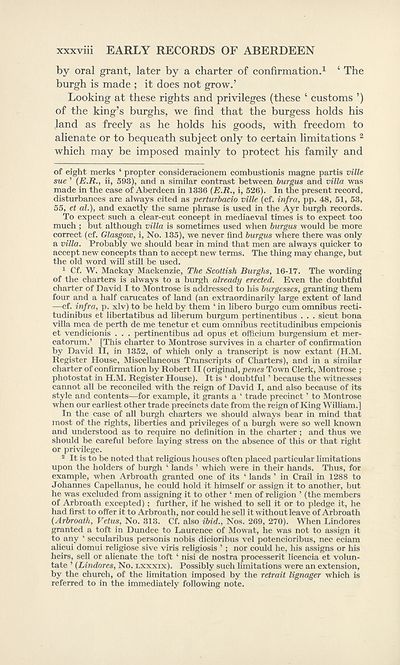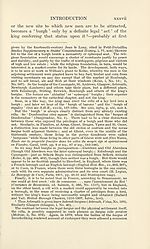Series 3 > Early records of the Burgh of Aberdeen
(43) Page xxxviii
Download files
Complete book:
Individual page:
Thumbnail gallery: Grid view | List view

xxxviii EARLY RECORDS OF ABERDEEN
by oral grant, later by a charter of confirmation.1 ‘ The
burgh is made ; it does not grow.’
Looking at these rights and privileges (these ‘ customs ’)
of the king’s burghs, we find that the burgess holds his
land as freely as he holds his goods, with freedom to
alienate or to bequeath subject only to certain limitations 2
which may be imposed mainly to protect his family and
of eight merks ‘ propter consideracionem combustionis magne partis ville
sue ’ (E.R., ii, 593), and a similar contrast between burgus and villa was
made in the case of Aberdeen in 1336 (E.R., i, 526). In the present record,
disturbances are always cited as perturbacio ville (cf. infra, pp. 48, 51, 53,
55, et al.), and exactly the same phrase is used in the Ayr burgh records.
To expect such a clear-cut concept in mediaeval times is to expect too
much; but although villa is sometimes used when burgus would be more
correct (cf. Glasgow, i, No. 135), we never find burgus where there was only
a villa. Probably we should bear in mind that men are always quicker to
accept new concepts than to accept new terms. The thing may change, but
the old word will still be used.
1 Cf. W. Mackay Mackenzie, The Scottish Burghs, 16-17. The wording
of the charters is always to a burgh already erected. Even the doubtful
charter of David I to Montrose is addressed to his burgesses, granting them
four and a half carucates of land (an extraordinarily large extent of land
—cf. infra, p. xlv) to be held by them ‘ in libero burgo cum omnibus recti-
tudinibus et libertatibus ad liberum burgum pertinentibus . . . sicut bona
villa mea de perth de me tenetur et cum omnibus rectitudinibus empcionis
et vendicionis . . . pertinentibus ad opus et officium hurgensium et mer-
catorum.’ [This charter to Montrose survives in a charter of confirmation
by David II, in 1352, of which only a transcript is now extant (H.M.
Register House, Miscellaneous Transcripts of Charters), and in a similar
charter of confirmation by Robert II (original, penes Town Clerk, Montrose ;
photostat in H.M. Register House). It is ‘ doubtful ’ because the witnesses
cannot all be reconciled with the reign of David I, and also because of its
style and contents—for example, it grants a ‘ trade precinct ’ to Montrose
when our earliest other trade precincts date from the reign of King William.]
In the case of all burgh charters we should always bear in mind that
most of the rights, liberties and privileges of a burgh were so well known
and understood as to require no definition in the charter ; and thus we
should be careful before laying stress on the absence of this or that right
or privilege.
2 It is to be noted that religious houses often placed particular limitations
upon the holders of burgh ‘ lands ’ which were in their hands. Thus, for
example, when Arbroath granted one of its ‘ lands ’ in Crail in 1288 to
Johannes Capellanus, he could hold it himself or assign it to another, but
he was excluded from assigning it to other ‘ men of religion ’ (the members
of Arbroath excepted) ; further, if he wished to sell it or to pledge it, he
had first to offer it to Arbroath, nor could he sell it without leave of Arbroath
(Arbroath, Vetus, No. 313. Cf. also ibid., Nos. 269, 270). When Lindores
granted a toft in Dundee to Laurence of Mowat, he was not to assign it
to any ‘ secularibus personis nobis dicioribus vel potencioribus, nec eciam
alicui domui religiose sive viris religiosis ’ ; nor could he, his assigns or his
heirs, sell or alienate the toft ‘ nisi de nostra processerit licencia et volun-
tate ’ (Lindores, No. lxxxix). Possibly such limitations were an extension,
by the church, of the limitation imposed by the retrait lignager which is
referred to in the immediately following note.
by oral grant, later by a charter of confirmation.1 ‘ The
burgh is made ; it does not grow.’
Looking at these rights and privileges (these ‘ customs ’)
of the king’s burghs, we find that the burgess holds his
land as freely as he holds his goods, with freedom to
alienate or to bequeath subject only to certain limitations 2
which may be imposed mainly to protect his family and
of eight merks ‘ propter consideracionem combustionis magne partis ville
sue ’ (E.R., ii, 593), and a similar contrast between burgus and villa was
made in the case of Aberdeen in 1336 (E.R., i, 526). In the present record,
disturbances are always cited as perturbacio ville (cf. infra, pp. 48, 51, 53,
55, et al.), and exactly the same phrase is used in the Ayr burgh records.
To expect such a clear-cut concept in mediaeval times is to expect too
much; but although villa is sometimes used when burgus would be more
correct (cf. Glasgow, i, No. 135), we never find burgus where there was only
a villa. Probably we should bear in mind that men are always quicker to
accept new concepts than to accept new terms. The thing may change, but
the old word will still be used.
1 Cf. W. Mackay Mackenzie, The Scottish Burghs, 16-17. The wording
of the charters is always to a burgh already erected. Even the doubtful
charter of David I to Montrose is addressed to his burgesses, granting them
four and a half carucates of land (an extraordinarily large extent of land
—cf. infra, p. xlv) to be held by them ‘ in libero burgo cum omnibus recti-
tudinibus et libertatibus ad liberum burgum pertinentibus . . . sicut bona
villa mea de perth de me tenetur et cum omnibus rectitudinibus empcionis
et vendicionis . . . pertinentibus ad opus et officium hurgensium et mer-
catorum.’ [This charter to Montrose survives in a charter of confirmation
by David II, in 1352, of which only a transcript is now extant (H.M.
Register House, Miscellaneous Transcripts of Charters), and in a similar
charter of confirmation by Robert II (original, penes Town Clerk, Montrose ;
photostat in H.M. Register House). It is ‘ doubtful ’ because the witnesses
cannot all be reconciled with the reign of David I, and also because of its
style and contents—for example, it grants a ‘ trade precinct ’ to Montrose
when our earliest other trade precincts date from the reign of King William.]
In the case of all burgh charters we should always bear in mind that
most of the rights, liberties and privileges of a burgh were so well known
and understood as to require no definition in the charter ; and thus we
should be careful before laying stress on the absence of this or that right
or privilege.
2 It is to be noted that religious houses often placed particular limitations
upon the holders of burgh ‘ lands ’ which were in their hands. Thus, for
example, when Arbroath granted one of its ‘ lands ’ in Crail in 1288 to
Johannes Capellanus, he could hold it himself or assign it to another, but
he was excluded from assigning it to other ‘ men of religion ’ (the members
of Arbroath excepted) ; further, if he wished to sell it or to pledge it, he
had first to offer it to Arbroath, nor could he sell it without leave of Arbroath
(Arbroath, Vetus, No. 313. Cf. also ibid., Nos. 269, 270). When Lindores
granted a toft in Dundee to Laurence of Mowat, he was not to assign it
to any ‘ secularibus personis nobis dicioribus vel potencioribus, nec eciam
alicui domui religiose sive viris religiosis ’ ; nor could he, his assigns or his
heirs, sell or alienate the toft ‘ nisi de nostra processerit licencia et volun-
tate ’ (Lindores, No. lxxxix). Possibly such limitations were an extension,
by the church, of the limitation imposed by the retrait lignager which is
referred to in the immediately following note.
Set display mode to:
![]() Universal Viewer |
Universal Viewer | ![]() Mirador |
Large image | Transcription
Mirador |
Large image | Transcription
Images and transcriptions on this page, including medium image downloads, may be used under the Creative Commons Attribution 4.0 International Licence unless otherwise stated. ![]()
| Scottish History Society volumes > Series 3 > Early records of the Burgh of Aberdeen > (43) Page xxxviii |
|---|
| Permanent URL | https://digital.nls.uk/126829839 |
|---|
| Attribution and copyright: |
|
|---|
| Description | Over 180 volumes, published by the Scottish History Society, containing original sources on Scotland's history and people. With a wide range of subjects, the books collectively cover all periods from the 12th to 20th centuries, and reflect changing trends in Scottish history. Sources are accompanied by scholarly interpretation, references and bibliographies. Volumes are usually published annually, and more digitised volumes will be added as they become available. |
|---|


